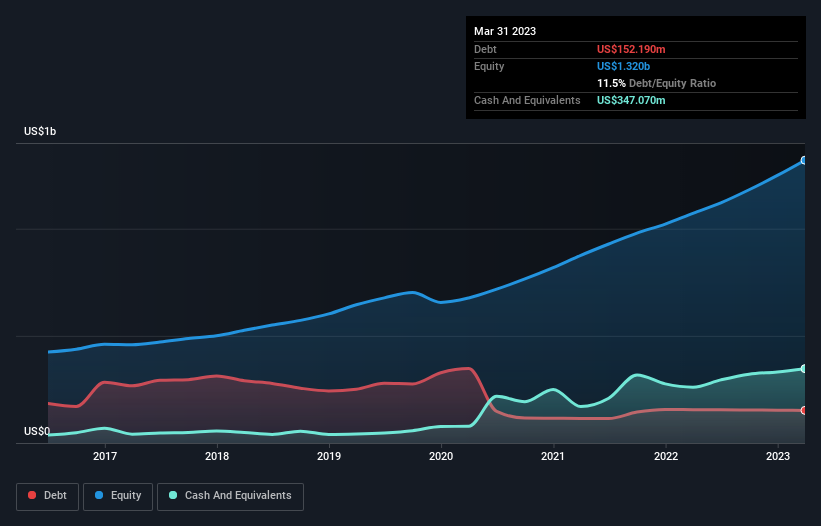
The external fund manager backed by Berkshire Hathaway's Charlie Munger, Li Lu, makes no bones about it when he says 'The biggest investment risk is not the volatility of prices, but whether you will suffer a permanent loss of capital.' It's only natural to consider a company's balance sheet when you examine how risky it is, since debt is often involved when a business collapses. Importantly, The Ensign Group, Inc. (NASDAQ:ENSG) does carry debt. But should shareholders be worried about its use of debt?
Why Does Debt Bring Risk?
Debt assists a business until the business has trouble paying it off, either with new capital or with free cash flow. Part and parcel of capitalism is the process of 'creative destruction' where failed businesses are mercilessly liquidated by their bankers. However, a more usual (but still expensive) situation is where a company must dilute shareholders at a cheap share price simply to get debt under control. Having said that, the most common situation is where a company manages its debt reasonably well - and to its own advantage. The first step when considering a company's debt levels is to consider its cash and debt together.
View our latest analysis for Ensign Group
How Much Debt Does Ensign Group Carry?
As you can see below, Ensign Group had US$152.2m of debt, at March 2023, which is about the same as the year before. You can click the chart for greater detail. However, it does have US$347.1m in cash offsetting this, leading to net cash of US$194.9m.

A Look At Ensign Group's Liabilities
According to the last reported balance sheet, Ensign Group had liabilities of US$585.3m due within 12 months, and liabilities of US$1.96b due beyond 12 months. On the other hand, it had cash of US$347.1m and US$444.2m worth of receivables due within a year. So it has liabilities totalling US$1.75b more than its cash and near-term receivables, combined.
Ensign Group has a market capitalization of US$5.40b, so it could very likely raise cash to ameliorate its balance sheet, if the need arose. However, it is still worthwhile taking a close look at its ability to pay off debt. Despite its noteworthy liabilities, Ensign Group boasts net cash, so it's fair to say it does not have a heavy debt load!
Also good is that Ensign Group grew its EBIT at 14% over the last year, further increasing its ability to manage debt. The balance sheet is clearly the area to focus on when you are analysing debt. But it is future earnings, more than anything, that will determine Ensign Group's ability to maintain a healthy balance sheet going forward. So if you want to see what the professionals think, you might find this free report on analyst profit forecasts to be interesting.
But our final consideration is also important, because a company cannot pay debt with paper profits; it needs cold hard cash. Ensign Group may have net cash on the balance sheet, but it is still interesting to look at how well the business converts its earnings before interest and tax (EBIT) to free cash flow, because that will influence both its need for, and its capacity to manage debt. Over the most recent three years, Ensign Group recorded free cash flow worth 66% of its EBIT, which is around normal, given free cash flow excludes interest and tax. This free cash flow puts the company in a good position to pay down debt, when appropriate.
Summing Up
Although Ensign Group's balance sheet isn't particularly strong, due to the total liabilities, it is clearly positive to see that it has net cash of US$194.9m. The cherry on top was that in converted 66% of that EBIT to free cash flow, bringing in US$109m. So we don't think Ensign Group's use of debt is risky. Over time, share prices tend to follow earnings per share, so if you're interested in Ensign Group, you may well want to click here to check an interactive graph of its earnings per share history.
If you're interested in investing in businesses that can grow profits without the burden of debt, then check out this free list of growing businesses that have net cash on the balance sheet.
Valuation is complex, but we're here to simplify it.
Discover if Ensign Group might be undervalued or overvalued with our detailed analysis, featuring fair value estimates, potential risks, dividends, insider trades, and its financial condition.
Access Free AnalysisHave feedback on this article? Concerned about the content? Get in touch with us directly. Alternatively, email editorial-team (at) simplywallst.com.
This article by Simply Wall St is general in nature. We provide commentary based on historical data and analyst forecasts only using an unbiased methodology and our articles are not intended to be financial advice. It does not constitute a recommendation to buy or sell any stock, and does not take account of your objectives, or your financial situation. We aim to bring you long-term focused analysis driven by fundamental data. Note that our analysis may not factor in the latest price-sensitive company announcements or qualitative material. Simply Wall St has no position in any stocks mentioned.
About NasdaqGS:ENSG
Ensign Group
Provides skilled nursing, senior living, and rehabilitative services.
Excellent balance sheet with moderate growth potential.

